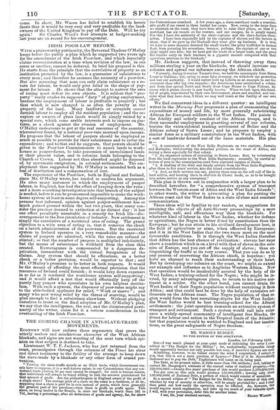IRISH POOR-LAW REFORM.
WITH a praiseworthy pertinacity, the Reverend Thadeus O'Malley keeps before the public a plan which he suggested two years ago for the amendment of the Irish Poor-law, and which especially claims reconsideration at a time when revision of the law, in one sense or another, cannot be deferred. In brief his proposal is this. He starts from the principle that the correlative of property as an institution protected by the law, is a guarantee of subsistence to every man; and therefore he assumes the necessity of a poor-law. But also assuming that man can only claim subsistence as a re- turn for labour, he would only give relief in the shape of pay- ment for labour. He shows that the attempt to narrow the area of rating must defeat its own objects. It is seldom that " pro- perty" really evades its supposed " duty " of giving employment, because the employment of labour is profitable to property ; but that which is now charged is as often the poverty as the property of the land. Many landlords or occupiers cannot furnish labour to employ all the resident population ; and the oc- cupiers or owners of grass lands would be simply ruined by a special rate, which some arable interests seek to impose on pas- tures, as a check against the evasion of employment. Mr. O'Malley endeavours to get at the real resources of the country, wheresoever found, by a national poor-rate assessed upon income. He proposes that the labour of paupers should be employed as much as possible to provide for their subsistence and to cover the expenditure; and to that end he suggests, that powers should be given to the Poor-law Commissioners to annex lands to work- houses as pauper-farms, to take possession of unreclaimed lands at their present value, and to colonize lands belonging to the Church or Crown. Labour not thus absorbed might be disposed of, by systematic emigration, in colonial settlements. The em- ployment thus suggested by Mr. O'Malley is intended both as a test of destitution and a compensation of cost. The experience of the Poor-law, both in England and Ireland, since Mr. O'Malley wrote, has tended to confirm his argument. He cites many instances in which the employment of pauper labour, in England, has had the effect of keeping down the rates; and a more searching investigation into that branch of the subject is needed, before it can be pronounced impossible to make the work- house system at least in some degree self-supporting. Among the persons best informed, opinion against pauper-settlement has so much gained ground within the last two years, that many con- sider the practice doomed to extinction at no distant day : it has one effect peculiarly unsuitable in a remedy for Irish ills—dis- couragement to the free circulation of industry. Now settlement is simply the correlative of a restricted area of rating. The grand objection to a wide area of rating is, that it removes the check on a lavish administration of the poor-rates. But the restricted system in Ireland operates in a very remarkable manner—the claims of paupers are admitted, while the rates are refused or stinted ; so that the number of paupers is multiplied indefinitely, but the means of subsistence is withheld from the class thus created. Extravagance is compensated by a dangerous de- privation, inconsistent with the virtual recognition of the claims. Any system that should be efficacious, as a better check or a better provision, would be superior to that ; and Mr. O'Malley's promises to be better in both respects. It would be the means of affording the most effectual provision that the resources of Ireland could furnish ; it would keep down expenses in so far as it rendered the workhouse system self-supporting ; and it would afford a test that would effectually keep off the purely lazy pauper who speculates in his own helpless destitu- tion. With such a system, the dispenser of poor-rates might say to the able-bodied applicant for relief, "Work or starve " ; and many who now wring relief by the threat of starving, would be glad enough to find a subsistence elsewhere. Without pledging ourselves to insist on the final adoption of Mr. O'Malley's plan, we say that the intelligence, the zeal, and the disinterested perti- nacity of the writer, claim for it a serious consideration in the overhauling of the Irish Poor-law.


























 Previous page
Previous page